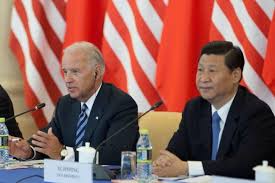Chinese President Xi Jinping waves as he walks with US President Joe Biden at the Filoli estate on the sidelines of the Asia-Pacific Economic Cooperation (APEC) summit in Woodside, California.

SAN FRANCISCO/HONG KONG, Nov 16 (Reuters)-When Chinese President Xi Jinping met executives for dinner in San Francisco on Wednesday evening, he was greeted with not one, but three standing ovations from American multinationals.
It was one of several public relations victories scored by the Chinese leader during his first trip in six years to the United States, where he and President Joe Biden reached deals on fentanyl, military communications and artificial intelligence on the sidelines of Asia-Pacific Economic Cooperation Pacific. encounter.
All three were outcomes the United States expected from China and not the other way around, two people briefed on the trip said.
But Xi seems to have achieved his goals: obtaining political concessions from the United States in exchange for promises of cooperation, an easing of bilateral tensions that would allow greater attention to economic growth and the possibility of attracting foreign investors who increasingly want to see China avoids.
“We invite our business friends around the world to invest in China and strengthen their presence,” he told an APEC CEO summit, vowing to take action on the list of problems which irritate foreign investors (theft of intellectual property and data security).
China’s economy is slowing, and earlier this month the country reported its first quarterly foreign direct investment deficit. And the ruling Communist Party is grappling with political intrigue that has raised questions about Xi’s decision-making, including the sudden and inexplicable withdrawal of his foreign and defense ministers.
“If the United States and China can bring their differences under control … it will mean that Xi Jinping will not have to focus all his attention on these (bilateral relations),” said Alexander Neill, a research associate at the Pacific Forum in Hawaii.
“He needs to focus on his domestic agenda, which is incredibly urgent. »
Lift sanctions in case of cooperation
Securing Xi’s promise to cooperate with China to stem the flow of fentanyl to the United States was high on Biden’s to-do list for the summit.
A senior US official said the agreement, under which China would take action against certain companies producing fentanyl precursors, was reached based on the principle of “trust but verify”.
In exchange, the U.S. government on Thursday removed a Chinese public security forensic institute from the Commerce Department’s trade sanctions list, where it had been placed in 2020 for alleged abuses against Uyghurs, a longtime diplomatic target from China.
Critics warned that lifting sanctions on the institute would signal to Beijing that the listing of U.S. companies was negotiable and questioned the Biden administration’s determination to pressure China over China’s alleged genocide of the Uighurs. the Chinese government.
“This undermines the credibility of our entity list and our moral authority,” said a spokesperson for the Republican-led House Select Committee on China.
Moreover, Biden’s Republican opponents argue that the United States is missing an opportunity by not taking advantage of China’s slowing economic momentum for further diplomatic gains.
Biden also called the agreement to resume military dialogues, which China broke after negotiations with the United States, a success.
House Speaker Nancy Pelosi’s 2022 trip to Taiwan, claimed by the Chinese.
But even if Beijing would like a reduction in tensions, it is unlikely to change China’s military behavior that the United States considers dangerous, such as the interception of American ships and planes in international waters, which has led to a number of near misses.
“China is concerned that the hotlines are being used as a potential pretext for a U.S. presence in areas it claims as its own,” said Craig Singleton, a China expert at the Defense Foundation democracies in Washington.
Biden administration officials acknowledged that establishing a functional military relationship would not be as simple as biannual meetings between defense officials.
“It’s long, hard, slow work, and the Chinese need to realize the value of these millions before they do it.”
“This won’t do us any favors,” a senior Biden administration official told Reuters in October, ahead of the Xi-Biden meeting.
PARTNER AND FRIEND?
In his public remarks to Biden, Xi suggested that China seeks to peacefully coexist with the United States, telling business leaders that China is willing to be a “partner and friend” of the United States in various industries and resorting to exit bans and detentions against the United States. some managers.
Likewise, Xi’s televised garden walk with Biden and the largely respectful reception given to Xi by his American hosts were played up in China’s tightly controlled media to show the domestic audience that their president is managing relations most important economic and political issues in the country.
“Xi Jinping may have calculated that exaggerating the US threat would do more harm than good to China, his position within the party and the party itself,” said Drew Thompson, a former Pentagon official. , now a researcher at the National University. of China Singapore is .
“The fact that we are debating whether China is likely to invest is a real problem for China.”
At the same time, Xi reiterated to Biden the points he made to Russian President Vladimir Putin earlier this year, urging the US president to view US-China relations from the perspective of ” acceleration of the global transformations that have occurred over the last century.”
Analysts say this reflects the belief that China – and Russia – are reshaping the US-led international system.
But this time, pragmatism may have taken precedence over ideology.
China recognizes that it is still necessary for its economic progress to maintain somewhat normal relations with the United States and Western countries, said Li Mingjiang, a professor at the Rajaratnam School of International Studies in Singapore.



